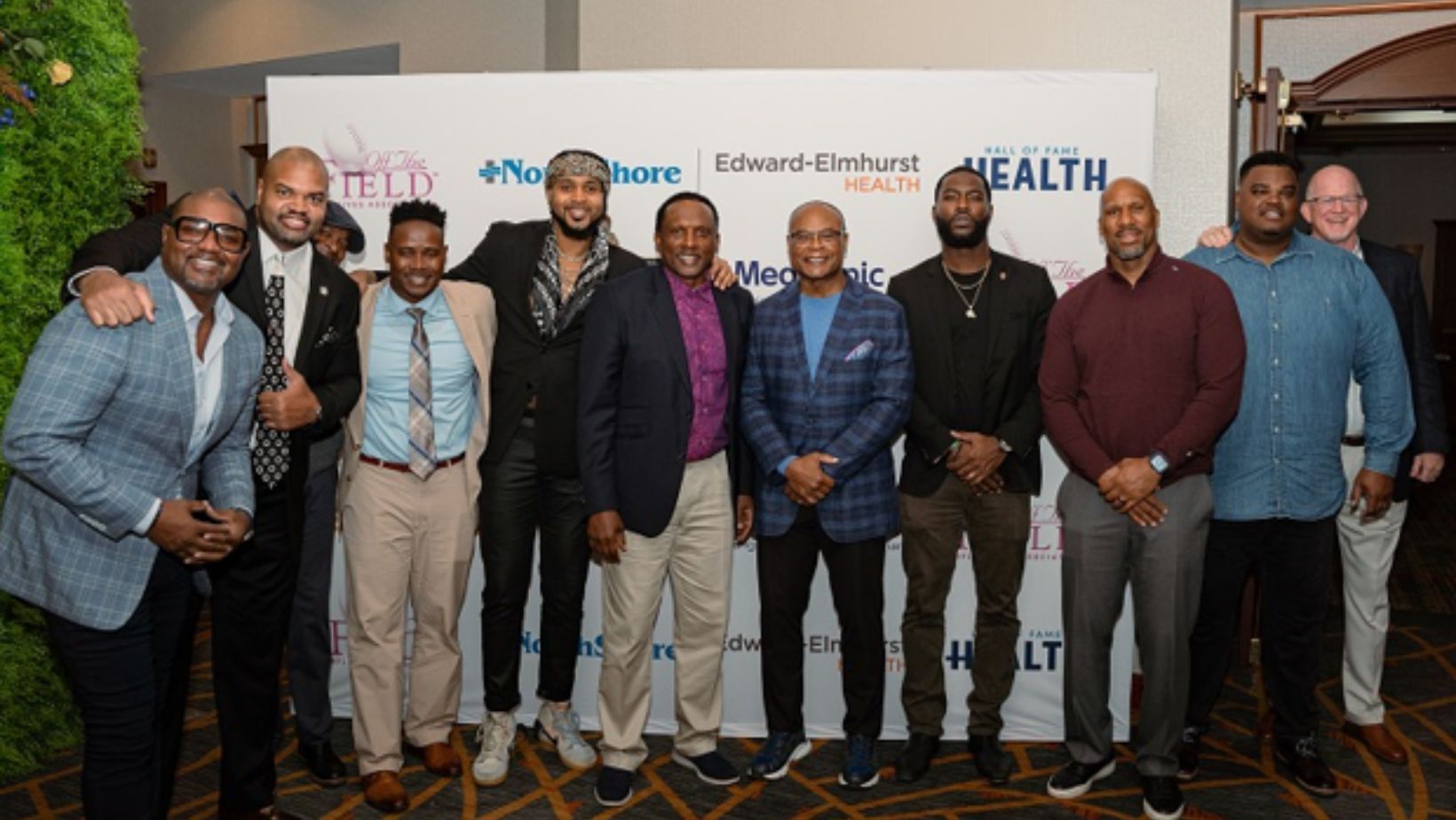
The transition from professional sports to everyday life poses significant challenges for athletes, particularly in the realm of mental health. This article delves into the intricate aspects of life after football, highlighting key discussions and insights from a recent event hosted by Endeavor Health in collaboration with Off the Field NFL Wives Association and Hall of Fame Health.
The event, titled “Cocktails and Conversations,” held at the Hilton Magnificent Mile Chicago last month, offered a platform for discussing pain management, mental health, and the transition to post-football life.
Endeavor Health’s Partnership With Elite Organizations: The Collaborative Effort for Athlete Well-being
Endeavor Health’s recent collaboration with two prestigious organizations to facilitate discussions on life after professional sports marks a significant step in addressing mental health issues faced by athletes. This partnership signifies a commitment to exploring the complexities of transitioning from the highs of professional sports to a more ordinary existence, where mental health often becomes a central concern.
Off the Field NFL Wives Association’s Role: Supporting the Transition Journey
The involvement of the Off the Field NFL Wives Association in the “Cocktails and Conversations” event underscores the importance of family and community support in an athlete’s life. This organization, comprising wives and significant others of active and retired NFL players, plays a vital role in providing emotional and practical support during the challenging transition from the football field to everyday life.
Hilton Magnificent Mile Chicago: A Gathering Place for Meaningful Conversations
The Hilton Magnificent Mile Chicago served as the perfect venue for the event, providing a comfortable and elegant setting conducive to open and meaningful discussions. The choice of venue reflects the importance of creating a welcoming and supportive environment for athletes and their families to discuss and address the challenges associated with leaving professional sports.
Physical and Mental Health Post-Retirement: The Dual Challenge for Retiring Athletes
Retirement from professional sports is not just about dealing with physical ailments but also grappling with mental health and emotional well-being. The transition can be particularly challenging as athletes navigate the loss of their professional identity and the adrenaline-filled lifestyle they are accustomed to.
Mike Singletary’s Keynote Speech: Insights From a Football Legend
Mike Singletary, a former Chicago Bear legend, Super Bowl champion, and Pro Football Hall of Famer, brought a wealth of experience to the discussion. His keynote speech, informed by his own physical and mental health journey, highlighted the unique challenges faced by athletes as they transition away from the sport.
The Attachment to the Game: Recognizing the Emotional Bond
Singletary’s observation about the attachment players have to the game sheds light on the emotional challenges faced by athletes post-retirement. This attachment, often unrecognized until they leave the sport, plays a significant role in their mental health journey.
Bringing Awareness to Post-Football Challenges: Singletary’s Perspective on Transition
Singletary emphasized the importance of events like “Cocktails and Conversations” in raising awareness about the struggles athletes face post-retirement.

He pointed out that while players are conditioned to handle physical pain, dealing with mental health issues requires a different approach and understanding.
Walter J. Whang’s Praise for Singletary: A Psychiatrist’s Viewpoint
Dr. Walter J. Whang, a renowned psychiatrist and medical director, lauded Singletary’s speech for its insightfulness. He highlighted the pitfalls former players face, such as isolation and loss of purpose, which are crucial in understanding the transition process.
Loss of Camaraderie and Purpose: Major Life Changes for Athletes
The loss of bonds with fellow players and the sense of purpose they derive from their sport can be one of the most challenging aspects of retirement for athletes. This loss often leads to significant emotional upheaval and a need for support in finding new paths and purposes in life.
The Temptation to Self-Medicate: A Risk for Former Athletes
Transitioning away from professional sports can sometimes lead to the temptation to self-medicate or abuse substances as a coping mechanism. This highlights the need for robust support systems and mental health resources for athletes navigating this challenging phase.
Jarrett Irons on Identity and Self-Loss: Life Beyond the Football Field
Former Arizona Cardinals player Jarrett Irons spoke about the profound loss of identity and self that athletes experience post-retirement. This loss, coupled with the absence of team camaraderie, presents significant challenges in adjusting to life after football.
The Irons Brothers’ Post-Graduate Achievements: Setting an Example in Education
Jarrett Irons and his brother Grant Irons, who played with the Buffalo Bills and Oakland Raiders, exemplify the importance of education in transitioning from sports. Following in the footsteps of their father, Gerald Irons, who earned a master’s degree while playing professionally, they, too, pursued post-graduate education, highlighting an alternative path for life after sports.
While former Cardinals player Jarrett Irons and his colleagues focus on enhancing mental wellness, their dedication to a healthy sports culture stands in stark contrast to the narratives surrounding sports betting apps in Arizona. Discover how these former players are reshaping the conversation around mental health and life after professional sports.
Final Thoughts
This comprehensive exploration of the challenges and opportunities faced by former NFL players as they transition to life after football sheds light on the multifaceted nature of this journey.
From mental health struggles to the loss of camaraderie and identity, the insights shared by former players, their families, and mental health professionals provide valuable perspectives on navigating this significant life change.
The journey of transitioning from the adrenaline-fueled world of professional football to a more conventional lifestyle is a complex and often underestimated path. It involves not only the physical toll taken on the body over years of rigorous sport but also a significant mental and emotional shift. The insights from events like “Cocktails and Conversations” are crucial in understanding this transition.
The discussions led by figures like Mike Singletary, with their firsthand experiences, offer an invaluable look into the personal challenges faced by athletes.
One of the critical aspects highlighted in this dialogue is the mental health of former players. As society’s understanding and acceptance of mental health issues continue to evolve, it becomes increasingly clear how pivotal mental wellness is for athletes transitioning out of professional sports.

The loss of daily routines, team camaraderie, and public adulation can lead to a sense of emptiness and loss of purpose, which can be debilitating if not addressed appropriately.
Furthermore, the role of family and community support, as represented by organizations like the Off the Field NFL Wives Association, cannot be overstated. These networks provide a safety net for players grappling with these transitions, offering emotional support and practical advice.
Education and preparation for life after sports are also critical. The examples set by athletes like the Irons brothers, who prioritized education and personal development alongside their sports careers, pave the way for a more holistic approach to life after professional sports.
This approach not only prepares athletes for the eventual transition but also provides them with tools and skills to succeed in their post-sports careers.
Lastly, the contrast between the focus on mental wellness by former players and the growing culture of sports betting highlights a significant dichotomy in sports culture.
While one emphasizes the well-being and holistic development of athletes, the other reflects a more commercial and arguably exploitative aspect of sports. This dichotomy poses questions about the direction of sports culture and the responsibilities of those involved in the industry.
In conclusion, the transition from professional football to life thereafter is a multi-faceted journey that requires attention, support, and understanding from all involved. The discussions and insights from events like the one hosted by Endeavor Health and the stories of former players provide a deeper understanding and appreciation of the challenges faced by these athletes.
As awareness grows, so does the support system, helping to ensure that the transition is not just an end to a sports career but the beginning of a new and fulfilling chapter in their lives.











